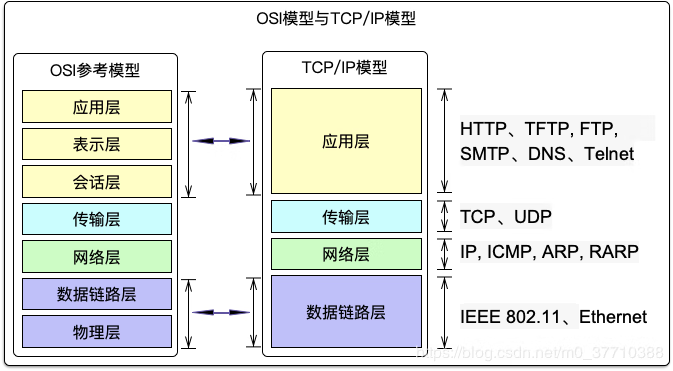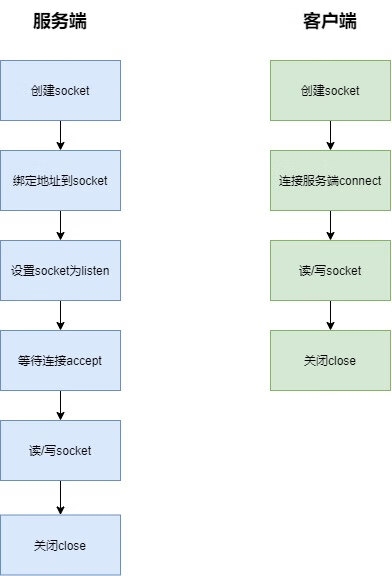本系列主要以TCP应用为指导,通过参考内核的网络实现,从应用层、传输层、网络层,自上而下的理解Linux内核网络设计,以加深对网络通讯内数据流传输路径的理解。
TCP协议简述
TCP协议的全称是Transmission Control Protocol,即传输控制协议,是一种面向连接的、可靠的、基于字节流的传输层通讯协议。在简化的计算机网络OSI模型中处于第四层指定的功能,UDP(用户数据报文协议)是同一层内另一个重要的传输协议。

TCP应用层通讯过程
一个简易的TCP服务端和客户端的通讯建立过程如下:

服务端
创建一个socket套接字;
int socket(int domain, int type, int protocol);创建一个
struct sockaddr_in的变量serveraddr,将socket绑定的协议簇、IP、端口等参数完善;struct sockaddr_in serveraddr绑定
serveraddr到socket;int bind(int sockfd, const struct sockaddr *addr,socklen_t addrlen);监听
socket上的连接。这里listen()将socket引用的套接字标记为被动套接字,即将用于使用 accept接收传入连接请求的套接字;int listen(int sockfd, int backlog);等待TCP客户端的连接;
int accept(int sockfd, struct sockaddr *addr, socklen_t *addrlen);当有TCP客户端与服务端建立连接后,
accept会返回一个新的socket,在服务端通过对新的socket进行read/write操作,就可以与TCP客户端进行消息的接收/发送。
客户端
相比服务端的建立,客户端就比较简单。
创建一个socket套接字;
int socket(int domain, int type, int protocol);设置服务端的IP、端口到
struct sockaddr *addr,与服务端建立连接;int connect(int sockfd, const struct sockaddr *addr,socklen_t addrlen);当连接成功后,通过
socket``read/write操作,就可以与TCP客户端进行消息的接收/发送。
演示
我们在一台Ubuntu主机上编译演示代码中的server.c和client.c,然后在该主机上进行演示.
gcc server.c -o server
gcc client.c -o client
执行指令
./server 8888运行服务端,端口号为8888;执行指令
./client 127.0.0.1 8888,让客户端连接本机的8888端口;./client 127.0.0.1 8888 Please enter msg:此时可以看到服务端监听到新的连接请求;
./server 8888 server established connection with localhost (127.0.0.1)此时在客户端输入要发送的内容"tcp test",然后回车发送,发送完成后,可以看到服务端会进行回显。
Please enter msg: tcp test Echo from server: tcp test此时可以看到服务端接收到的信息:
server received 9 bytes: tcp test至此,服务端的读写演示完成。
演示代码
服务端
/*
* tcpserver.c - A simple TCP echo server
* usage: tcpserver <port>
*/
#include <stdio.h>
#include <unistd.h>
#include <stdlib.h>
#include <string.h>
#include <netdb.h>
#include <sys/types.h>
#include <sys/socket.h>
#include <netinet/in.h>
#include <arpa/inet.h>
#define BUFSIZE 1024
/*
* error - wrapper for perror
*/
void error(char *msg)
{
perror(msg);
exit(1);
}
int main(int argc, char **argv)
{
int parentfd; /* parent socket */
int childfd; /* child socket */
int portno; /* port to listen on */
int clientlen; /* byte size of client's address */
struct sockaddr_in serveraddr; /* server's addr */
struct sockaddr_in clientaddr; /* client addr */
struct hostent *hostp; /* client host info */
char buf[BUFSIZE]; /* message buffer */
char *hostaddrp; /* dotted decimal host addr string */
int optval; /* flag value for setsockopt */
int n; /* message byte size */
/*
* check command line arguments
*/
if (argc != 2)
{
fprintf(stderr, "usage: %s <port>\n", argv[0]);
exit(1);
}
portno = atoi(argv[1]);
/*
* socket: create the parent socket
*/
parentfd = socket(AF_INET, SOCK_STREAM, 0);
if (parentfd < 0)
error("ERROR opening socket");
/* setsockopt: Handy debugging trick that lets
* us rerun the server immediately after we kill it;
* otherwise we have to wait about 20 secs.
* Eliminates "ERROR on binding: Address already in use" error.
*/
// optval = 1;
// setsockopt(parentfd, SOL_SOCKET, SO_REUSEADDR,
// (const void *)&optval, sizeof(int));
/*
* build the server's Internet address
*/
bzero((char *)&serveraddr, sizeof(serveraddr));
/* this is an Internet address */
serveraddr.sin_family = AF_INET;
/* let the system figure out our IP address */
serveraddr.sin_addr.s_addr = htonl(INADDR_ANY);
/* this is the port we will listen on */
serveraddr.sin_port = htons((unsigned short)portno);
/*
* bind: associate the parent socket with a port
*/
if (bind(parentfd, (struct sockaddr *)&serveraddr,
sizeof(serveraddr)) < 0)
error("ERROR on binding");
/*
* listen: make this socket ready to accept connection requests
*/
if (listen(parentfd, 5) < 0) /* allow 5 requests to queue up */
error("ERROR on listen");
/*
* main loop: wait for a connection request, echo input line,
* then close connection.
*/
clientlen = sizeof(clientaddr);
while (1)
{
/*
* accept: wait for a connection request
*/
childfd = accept(parentfd, (struct sockaddr *)&clientaddr, &clientlen);
if (childfd < 0)
error("ERROR on accept");
/*
* gethostbyaddr: determine who sent the message
*/
hostp = gethostbyaddr((const char *)&clientaddr.sin_addr.s_addr,
sizeof(clientaddr.sin_addr.s_addr), AF_INET);
if (hostp == NULL)
error("ERROR on gethostbyaddr");
hostaddrp = inet_ntoa(clientaddr.sin_addr);
if (hostaddrp == NULL)
error("ERROR on inet_ntoa\n");
printf("server established connection with %s (%s)\n",
hostp->h_name, hostaddrp);
/*
* read: read input string from the client
*/
bzero(buf, BUFSIZE);
n = read(childfd, buf, BUFSIZE);
if (n < 0)
error("ERROR reading from socket");
printf("server received %d bytes: %s", n, buf);
/*
* write: echo the input string back to the client
*/
n = write(childfd, buf, strlen(buf));
if (n < 0)
error("ERROR writing to socket");
close(childfd);
}
}
客户端
#include <stdio.h>
#include <stdlib.h>
#include <string.h>
#include <unistd.h>
#include <sys/types.h>
#include <sys/socket.h>
#include <netinet/in.h>
#include <netdb.h>
#define BUFSIZE 1024
/*
* error - wrapper for perror
*/
void error(char *msg) {
perror(msg);
exit(0);
}
int main(int argc, char **argv) {
int sockfd, portno, n;
struct sockaddr_in serveraddr;
struct hostent *server;
char *hostname;
char buf[BUFSIZE];
/* check command line arguments */
if (argc != 3) {
fprintf(stderr,"usage: %s <hostname> <port>\n", argv[0]);
exit(0);
}
hostname = argv[1];
portno = atoi(argv[2]);
/* socket: create the socket */
sockfd = socket(AF_INET, SOCK_STREAM, 0);
if (sockfd < 0)
error("ERROR opening socket");
/* gethostbyname: get the server's DNS entry */
server = gethostbyname(hostname);
if (server == NULL) {
fprintf(stderr,"ERROR, no such host as %s\n", hostname);
exit(0);
}
/* build the server's Internet address */
bzero((char *) &serveraddr, sizeof(serveraddr));
serveraddr.sin_family = AF_INET;
bcopy((char *)server->h_addr,
(char *)&serveraddr.sin_addr.s_addr, server->h_length);
serveraddr.sin_port = htons(portno);
/* connect: create a connection with the server */
if (connect(sockfd, (struct sockaddr *)&serveraddr, sizeof(serveraddr)) < 0)
error("ERROR connecting");
/* get message line from the user */
printf("Please enter msg: ");
bzero(buf, BUFSIZE);
fgets(buf, BUFSIZE, stdin);
/* send the message line to the server */
n = write(sockfd, buf, strlen(buf));
if (n < 0)
error("ERROR writing to socket");
/* print the server's reply */
bzero(buf, BUFSIZE);
n = read(sockfd, buf, BUFSIZE);
if (n < 0)
error("ERROR reading from socket");
printf("Echo from server: %s", buf);
close(sockfd);
return 0;
}